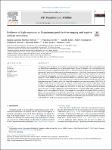Evidence of high exposure to Toxoplasma gondii in free-ranging and captive African carnivores
Ferreira, Susana Carolina Martins
Torelli, Francesca
Klein, Sandra
Fyumagwa, Robert D.
Karesh, William B.
Hofer, Heribert
Seeber, Frank
East, Marion L.
Toxoplasma gondii is an ubiquitous intracellular protozoan parasite. Mammals and birds are intermediate hosts and felid species are definitive hosts. In most human altered habitats the domestic cat is the predominant definitive host. Current knowledge of T. gondii infection in African ecosystems is limited. This study aimed to assess exposure to T. gondii in wild carnivores in the Serengeti ecosystem in East Africa. Carnivores can be infected by the consumption of tissue cysts when feeding on infected animals and by incidental ingestion of oocysts from environmental contamination. Incidental ingestion should occur regardless of a species’ diet whereas the consumption of cysts should increase the chance of infection in carnivorous species. This predicts higher seropositivity in carnivorous than in insectivorous carnivores and lower seropositivity in juvenile carnivores with a long dependency on milk than in adults. We found high seropositivity in carnivorous species: 100% (15 of 15 samples) in adult African lions, 93% (38 of 41 samples) in adult spotted hyenas and one striped hyena sample was positive, whereas all four samples from the insectivorous bat-eared fox were negative. Juvenile hyenas (11 of 19 sera) had significantly lower seropositivity than adults (38 of 41 sera). Long-term monitoring of spotted hyenas revealed no significant difference in seropositivity between two periods (1988–1992 and 2000 to 2016). Identical results were produced in lion and hyena samples by a commercial multi-species ELISA (at serum dilution 1:10) and an in-house ELISA based on a recombinant T. gondii protein (at serum dilution 1:100), making the latter a useful alternative for small amounts of serum. We suggest that diet, age and lifetime range are factors determining seropositivity in carnivores in the Serengeti ecosystem and suggest that the role of small wild felids in the spread of T. gondii in the African ecosystem warrants investigation.
Files in this item

